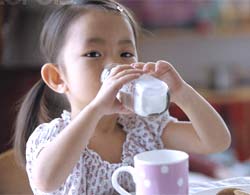For every 100 young children, there are 4 babies with cow's milk allergy
Redness, wheezing and difficulty breathing after cow's milk are indications that the child's immune system reacts to the protein content of milk. This phenomenon according to doctors is not strange, usually occurs in babies under 3 years old.
According to Dr. Hoang Thi Tin, Children's Hospital 1, Ho Chi Minh City, about 2-3% of children worldwide have cow's milk allergy (ie every 100 babies, 4 children have this disease). In which, 50% of children are free from milk allergies when they are 1 year old, 70% are 2 years old and when they are 3 years old.

The phenomenon of milk allergy depends on the child's location.Photo: Corbis.com.
There is still no conclusive conclusion about the cause of milk allergy in children. However, according to the doctor, the genetic factors associated with feeding babies with cow's milk or soy milk too early can be the cause of the phenomenon.
According to the doctor, symptoms of cow's milk allergy may appear within a few months after birth. Some children have immediate allergy symptoms immediately after feeding cow's milk, but some children have slower symptoms.
According to surveys, if both parents have food allergies, the rate of allergies is over 60%; if only one person has this condition, the genetic rate for children is nearly 40%. The allergenic food in children outside of milk also has egg white, peanut, wheat, fish meal.
The type of rapid allergic reaction usually occurs suddenly with symptoms such as vomiting, wheezing, rash, swelling of the face. More severe is an anaphylactic reaction. Manifestations of a slower, often delayed allergic reaction such as crying, diarrhea, vomiting, flatulence, slow weight gain.
Doctor Chu Chi Hieu, Head of the allergy department, Bach Mai Hospital said that allergy is the reaction of each person to each different food. The cow's milk in general has already contained ingredients that can cause allergies. Whether allergies occur or not must depend on the location of each user.
According to Mr. Hieu, in order to find out exactly the cause of allergy, it is necessary to have detailed epidemiological investigation with many different tests and clinical analyzes.
Dr. Nguyen Van Doan, Head of Allergy Department, Hanoi Medical University, said that allergy phenomenon will often decrease over time. Immediately after 5 years reduced to 50%, after 10 years reduced to 80%, however, there are cases where sensitive people must avoid all kinds of allergy-causing foods for life.
Because there are no tests to predict the basics of food allergies in general or milk allergies in particular, according to experts, detecting allergies depends on each person. If you eat or drink a food that has unusual reactions after eating or drinking, you should avoid or change food the next time.
Particularly for children identified with cow's milk protein allergy, it is necessary to switch to trial of milk types with low protein content causing allergic reactions such as rice milk, almond milk, non-dairy or Pareve formula. Infants, it is best to use breast milk. However, she must also be careful in her diet because cow's milk can be absorbed into breast milk if she uses cow's milk.
Doctors recommend, for children with allergic conditions, parents should check the ingredients on the product label before use. Even used products still have to re-read the information on the label because the manufacturer can change the ingredients. It is really necessary to inform the caregivers like nanny, teacher, grandparents about your baby's allergy.
In case the child has a bad expression after using food such as abdominal pain, dizziness, headache, cyanosis, it is necessary to quickly take to the hospital to find out the cause of poisoning or allergy to food and promptly handled.
- Genetically modified cows make milk safer
- Transgenic dairy cows produce human milk
- Caesarean babies are allergic
- Cautions for treating cough for young children
- Happy hormone injections for cows help make milk more delicious and nutritious
- Signs of milk tea poisoning you need to know
- Cows with formal names will give a lot of milk
- Why shouldn't cow's milk be given to babies?
- Breast milk reduces the risk of asthma in young children
- Illustrate the sequence and timing of baby teeth
- Cow 'for human milk'
- How to distinguish real milk and very good fake milk
 Green tea cleans teeth better than mouthwash?
Green tea cleans teeth better than mouthwash? Death kiss: This is why you should not let anyone kiss your baby's lips
Death kiss: This is why you should not let anyone kiss your baby's lips What is salmonellosis?
What is salmonellosis? Caution should be exercised when using aloe vera through eating and drinking
Caution should be exercised when using aloe vera through eating and drinking